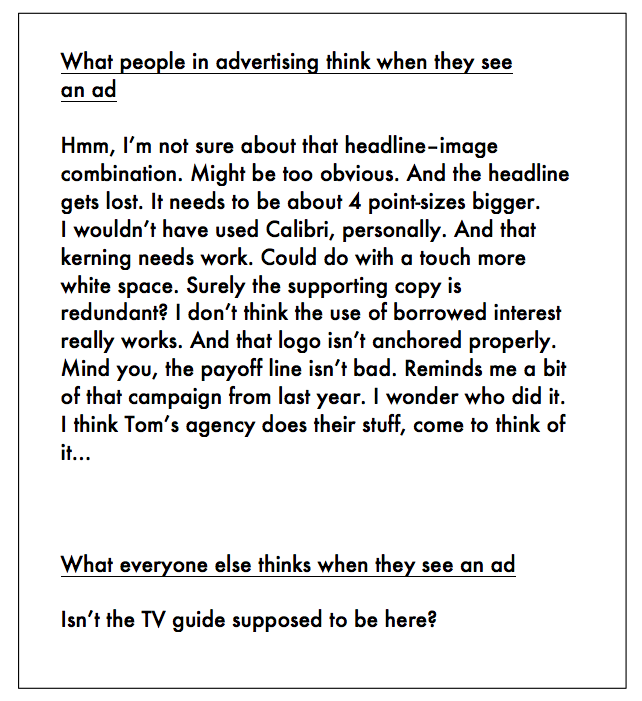I wish I had written this – but Ryan Wallman from Melbourne did.
Many years ago – too many for my liking – there was a TV commercial for a brand of garden sprinkler.
No, wait. It gets better, I promise.
This ad was remarkable.
It wasn’t famous, mind you. You won’t have read about it in advertising textbooks, and I doubt that it would have won any awards.
In fact, it was for a fairly obscure Australian brand that you’ve probably never heard of. Unless you lived in Perth in the 1980s. (If so: my condolences.)
Anyway, the remarkable thing about this ad was that nothing really happened. And it was silent.
The ad was little more than a black screen overlaid by a super that read (something to the effect of): ‘This is the sound of one of our sprinklers.” It ended with a shot of a lush lawn.
Aside from the fact that it neatly demonstrated a benefit of the product, the really striking aspect of this ad was that it stood in stark contrast to everything around it. All of the other ads at that time, and indeed most of the TV programs, were loud and tacky. It was the ‘80s, after all.
In that context, this unassuming little ad was almost impossible to ignore.
And it made a huge impression on me at the time. Funnily enough, I can still remember thinking “I would like to go into advertising so that I can make an ad like that”. Which is saying a lot, because gardening products interest me approximately as much as whitepapers on programmatic marketing.
So would that ad work today? In this era when all available space must be filled?
I think it would. Given the bluster and blather of advertising in the 21st century, such a simple idea would probably be more effective than ever.
Because for all the ‘noise’ that characterises modern marketing – the convoluted strategies, data dashboards, media plans, contextualised targeting, concept testing and what have you – the single most important rule of advertising is that it must be noticed.
This rule does not change with the times. It will always be true that if an ad doesn’t get noticed, it is pointless. Totally, utterly pointless.
Consider the last ad that you put out there. And be honest with yourself. If you saw that ad, would it stop you in your tracks?
If your answer is something like “Probably not, but the message is on-brand and the images are correctly placed in accordance with our style guidelines”: you’ve got a problem.
Nobody looking at your ad has your brief on hand. Nobody is checking it off against your strategy or wondering about your message hierarchy or measuring the height of your logo.
Indeed, the difference between how you see your ad and how your audience sees it might be summarised thus:
So the first question to ask about any advertising is: will it be noticed?
Then, sure, ask the other important questions. Is this the right message? Is the ad believable? Does it demonstrate the benefits? Is there a strong incentive? And so on.
But if the answer to that first question is “no”, all of those other questions are irrelevant.
If the answer is “yes”, on the other hand, then your message might get through. It might be remembered. It might be written about some 30 years later.
Hell, it might even inspire a career.
By Ryan Wallman, Head of Copy at Wellmark.

“Funnily enough, I can still remember thinking “I would like to go into advertising so that I can make an ad like that”. ”
Funnily enough, this article makes me want to go back into advertising.